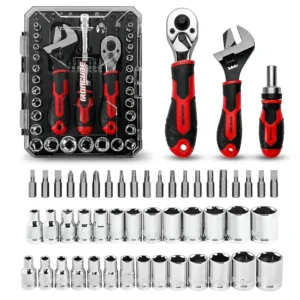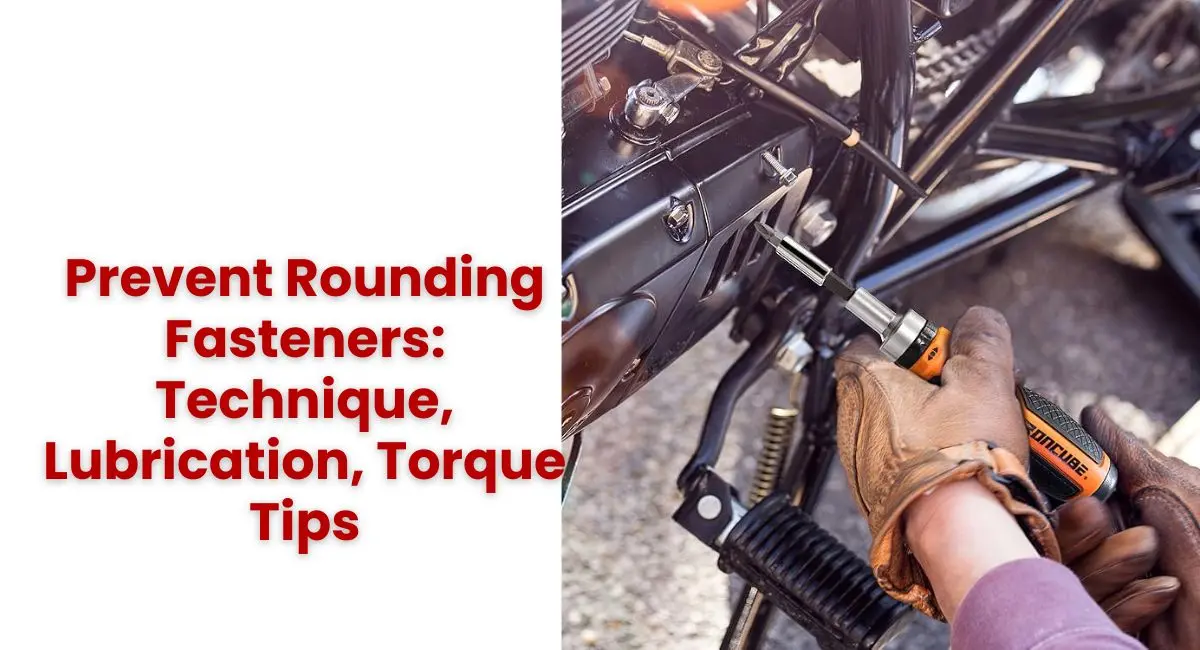Preventing the rounding of fasteners is essential for maintaining the integrity and longevity of mechanical assemblies, saving time and costs associated with repairs. This comprehensive blog explains detailed techniques, lubrication methods, and torque practices that effectively prevent fasteners from rounding, ensuring secure and reliable fastening.
This comprehensive guide dives deep into preventing rounding fasteners through proven techniques, smart lubrication strategies, and expert torque tips. Drawing from industry best practices and real-world insights, we’ll equip you with actionable knowledge to keep your projects smooth and your fasteners intact. Whether you’re wrenching on a classic car or assembling heavy machinery, mastering these elements can save hours, reduce scrap, and extend the life of your hardware. Let’s torque up and get started—because nothing beats the satisfaction of a clean, secure fit.
Understanding Fastener Rounding
Fastener rounding occurs when the edges of a bolt or nut become worn or stripped, making it difficult to grip and turn. This often happens due to improper tool usage, insufficient lubrication, or incorrect torque application. Understanding the mechanics behind this issue is the first step toward prevention.
For instance, using a standard wrench on a rusted bolt without lubrication can quickly lead to rounding. On the other hand, a ratcheting wrench offers better control and reduces the risk of slippage. Learn more about the differences between these tools in our article on Ratcheting Wrench vs Standard Wrench: When Each Wins.
Why Do Fasteners Round Off?
Before jumping into fixes, it’s important to understand the problem. Fasteners round off when the edges of their heads (hex, Phillips, Torx, etc.) get worn down by excessive force, misaligned tools, or poor-quality equipment.
Some of the most common culprits include:
-
Using the wrong size tool – A wrench or screwdriver that’s slightly too big or small will strip edges.
-
Poor-quality fasteners – Soft metals or poorly manufactured bolts are more prone to rounding.
-
Overtightening – Exceeding the recommended torque can deform the fastener.
-
Lack of lubrication – Dry threads increase friction, making it harder to remove or tighten.
-
Tool slippage – Worn-out or low-quality tools don’t grip properly, leading to rounding.
According to Wikipedia’s wrench guide, correct wrench-to-fastener fit is one of the most critical factors in preventing rounding.
Essential Techniques to Prevent Fastener Rounding
Use the Correct Tool Type and Size
A high-quality 6-point socket or wrench fits the flats of a fastener more securely than 12-point or adjustable wrenches, reducing slipping that causes rounding. Square, snug seating of tools fully onto the fastener head before applying torque is critical. Tools like ratcheting wrenches, especially precision-engineered ones, can maintain better contact and are recommended for sensitive or repeated use. For more on selecting the right wrench, see IronCube’s guide on what is a ratcheting wrench and their product range of wrenches.

Proper Tool Seating
Ensuring the tool is pushed firmly towards the fastener along the axis of the bolt helps prevent cam-out (tool slipping out), which is a common cause of rounding. Slight wrist movement during turning can confirm if the tool is fully engaged or slipping.
Avoid Using Low-Quality Tools
Cheap, worn, or poorly fitting tools increase the risk of fastener damage. Investing in premium tools with hardened steel, proper shape, and calibrated torque settings enhances performance and fastener protection.
Lubrication and Its Role in Fastener Protection
Why Lubricate Fasteners?
Lubrication reduces friction between mating threads and the tool interface, ensuring smooth tightening and loosening. Proper lubrication minimizes seizing, galling, and the torque needed, thus protecting fasteners from deformation.
How to Apply Lubrication Correctly
Coat all threads of the fastener so the lubricant fills the thread valleys, ensuring full coverage. Hand-tighten the nut or bolt until a slight bead of lubricant oozes from underneath, indicating adequate lubrication coverage. The goal is to reduce friction uniformly, not to slather excess which can attract dirt.
Best Lubricants for Fasteners
Specialized bolt pastes and molybdenum disulfide (“moly”) lubricants provide superior heat resistance and do not cause hydrogen-induced cracking common with other oils. For stainless steel fasteners, minimal lubrication is needed but still recommended to facilitate easier maintenance. Avoid using conventional oils or greases that can degrade or wash away quickly. Trusted sources suggest consulting with fastener manufacturers and utilizing the right type for your application. For more insights on lubrication, visit MarshFasteners’ guidance on lubricating nuts and bolts.
Mastering Torque: Achieving the Right Tightness Without Damage
Understanding Torque in Fastening
Torque is the rotational force applied to fasteners to generate clamping load. Correct torque ensures the fastener is tight enough to hold components together firmly without overstressing or deforming them.
Consequences of Improper Torque
-
Too Low Torque: Leads to loose fasteners that can vibrate loose, causing damage.
-
Too High Torque: Can strip threads, snap bolts, or round fastener heads from excess stress.
Use Torque Wrenches and Follow Specifications
Use a calibrated torque wrench to apply the manufacturer’s recommended torque settings, which account for the fastener material, size, coating, and operating conditions. This precision prevents failures and extends assembly life.
Torque Techniques
-
Turn the fastener smoothly, avoiding sudden jerks.
-
Follow torque-angle methods or yield control tightening for critical applications.
Periodic Torque Checks
Fasteners can loosen over time, so periodic inspection and retightening to specifications maintain joint integrity.
Comparative Table: Impact of Lubrication on Bolt Load and Torque
| Condition | Average Bolt Stress (Ksi) | Variation in Bolt Load | Effect on Fastener Life |
|---|---|---|---|
| No Lubrication | ~28.8 | High | Higher risk of damage |
| Partial Lubrication | Increased by about 5.4 | Moderate | Reduced damage, inconsistent |
| Full Lubrication | Close to target 40 | Low | Best protection and longevity |
Techniques to Prevent Rounding Fasteners
Choose the Right Tool
Using the correct tool is crucial. For example, a ratcheting wrench provides precision and reduces the risk of rounding. Explore our range of high-quality wrenches at IronCubeWorks Wrenches.
Proper Tool Fit
Ensure the tool fits snugly on the fastener. A loose fit increases the likelihood of rounding. For screws, a ratcheting screwdriver with the correct bit size is essential. Check out our 65pc Ratchet Screwdriver and Socket Bit Set for versatile options.
Apply Steady Pressure
Avoid sudden jerks or excessive force. Instead, apply steady, controlled pressure to minimize stress on the fastener.
Use Impact Tools Sparingly
While impact tools are powerful, they can easily strip fasteners. Reserve them for heavy-duty tasks and opt for hand tools whenever possible.
The Role of Lubrication in Preventing Rounding
Lubrication reduces friction, making it easier to turn fasteners without damaging them. Here’s how to use it effectively:
1. Choose the Right Lubricant
Select a lubricant suitable for the material and environment. For example, penetrating oils like WD-40 are ideal for rusted bolts, while silicone-based lubricants work well for plastic fasteners.
2. Apply Liberally
Don’t skimp on lubrication. Apply it generously to the threads and edges of the fastener for optimal results.
3. Allow Time to Penetrate
Give the lubricant time to seep into tight spaces, especially for rusted or stuck fasteners.
Recommended Tools from IronCube Works: Gear That Guards Against Rounding
No discussion on preventing rounding fasteners is complete without spotlighting tools designed for the fight. At IronCube Works, we craft gear that prioritizes grip, durability, and ease—because the right wrench isn’t just a tool; it’s your safeguard.
Our ratcheting wrenches stand out for confined spaces, with 72-tooth mechanisms delivering 5-degree swings that maintain square contact, slashing slip risks. Paired with six-point sockets, they embody anti-rounding engineering.
For finer work, the 65pc Ratchet Screwdriver and Socket Bit Set—available on Amazon—offers magnetic bits that seat flush, preventing cam-out on screws. Users rave about its torque retention, ideal for electronics where rounding means rework.
Browse our full Amazon store for bundles that bundle wrenches with lubes, streamlining your kit. Need advice? Hit contact us for custom recs.
These aren’t gimmicks—they’re battle-tested, helping thousands prevent rounding fasteners daily.
Real-World Case Studies: How Techniques, Lube, and Torque Saved the Day
Theory meets practice in these tales of triumph. Take auto shop veteran Mike, facing a rusted exhaust manifold on a ’98 Ford F-150. Standard wrenches rounded two bolts instantly—until he switched to a six-point ratcheting wrench from IronCube, soaked in penetrating oil, and torqued to 25 ft-lbs lubricated spec. Job done in under an hour, no extras needed.
In construction, a bridge crew battled aluminum rivets prone to stripping. Anti-seize application and low-torque sequences (15 in-lbs) via calibrated wrenches prevented 90% of failures, per site logs—echoing galling prevention studies.
A DIYer assembling IKEA hacks shared on forums: Proper cleaning and MoS2 lube on screws avoided rounding entirely, turning a wobbly shelf into a sturdy one. These stories underscore: Integrated strategies work wonders.
Summary
Preventing fastener rounding requires the right tools, proper technique, and effective lubrication. By following the tips outlined in this guide, you can avoid common pitfalls and achieve professional results. Explore our range of high-quality tools at IronCubeWorks and take your projects to the next level.
For more tips and tutorials, subscribe to our YouTube Channel or shop our products on Amazon.
Need assistance? Contact us at IronCubeWorks Contact.
FAQs
What causes fastener rounding?
Fastener rounding is typically caused by incorrect tool use, wrong tool size, excessive torque, corrosion, or debris causing the tool to slip and deform the fastener head.
Can lubrication prevent rounding?
Yes, proper lubrication reduces friction, making tightening and removing fasteners easier and less likely to cause rounding.
What tools are best to avoid rounding fasteners?
High-quality 6-point sockets, ratcheting wrenches, and correctly sized wrenches that firmly grip the flats instead of corners are recommended.
How important is torque control?
Torque control is critical; too much or too little torque can cause rounding, breakage, or loosening. Using calibrated torque wrenches and following specs extends fastener life.
Can rounded fasteners be removed?
Yes, with the right extraction tools and techniques such as impact sockets or bolt extractors, but prevention is preferable.

